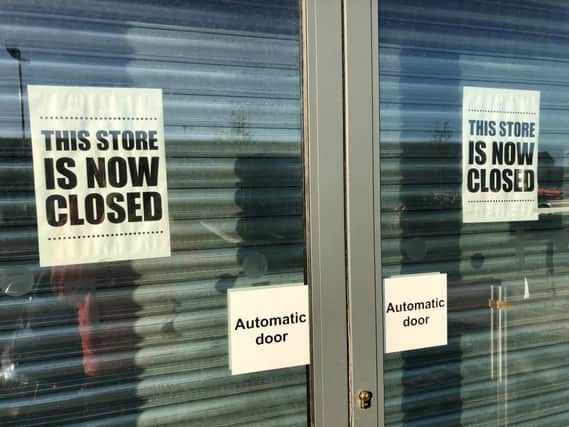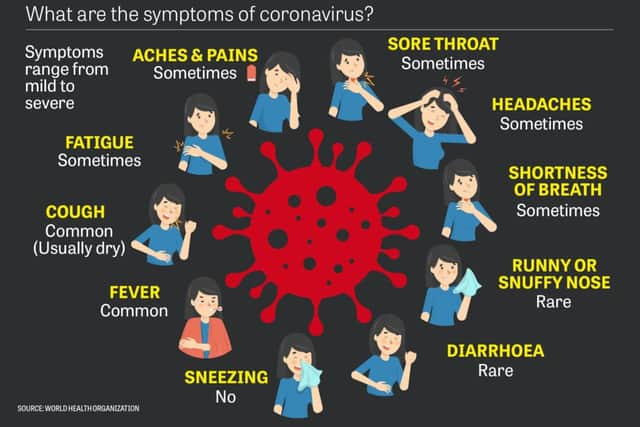These are the shops and services that will remain open during the UK lockdown


It has been announced that the UK is entering a full lockdown, with various businesses and venues being instructed by law to close their doors.
This is the full list, as released by the government, of businesses and facilities that will be closing - and the exceptions that could allow them to remain open.
Which shops are closing, and are there any exceptions?


Advertisement
Hide AdAdvertisement
Hide AdThis is the full list of businesses and places that are being instructed to close, and their exceptions.
Food and drink
Restaurants have been told to close their doors, but any food delivery or takeaway services can remain operational.
Cafes, including workplace canteens, should close, except for any food delivery and takeaway options. Cafes or canteens situated in hospitals, care homes, schools, prisons and those providing food and drink to the homeless can remain open.
Bars and nightclubs, including those in hotels or members clubs, will close.
Retail
Advertisement
Hide AdAdvertisement
Hide AdHair, massage parlours, beauty and nail salons, including piercing and tattoo studios, should close, without exception.
The retail categories that have notable exceptions include: supermarkets and other food shops, health shops, pharmacies (this includes non-dispensing pharmacies), petrol stations, bicycle shops, home and hardware shops, laundrettes and dry cleaners, garages, car rentals, pet shops, corner shops, newsagents, post offices and banks.
Outdoor and indoor markets will be closed, except for market stalls that offer essential retail, such as groceries and food.
Auction houses and car showrooms will close, without exception.
Hotels
Advertisement
Hide AdAdvertisement
Hide AdHotels, hostels, B and Bs, campsites and boarding houses for commercial use will close, except in the case where people live in these places as interim shelter while their primary residence is unavailable. Similarly, key workers can continue to stay in the likes of hotels, or similar, where required.
Caravan parks and sites for commercial uses will close, except in the instance where people live there permanently, or are staying there while their primary residence is unavailable.
Public spaces
Libraries will close, without exception.
Community centres, youth centres and other similar institutions will close, except in the case where these facilities are being used for the purposes of hosting essential voluntary or public services, such as food banks or homeless services.
Places of worship will close, except for funerals following social distancing guidelines, and for solitary prayer. Live streaming a service without an audience is also permitted.
Advertisement
Hide AdAdvertisement
Hide AdCinemas, theatres and concert halls will also close - but the guidelines state that “live streaming of a performance by a small group could be permissible with social distancing observed”.
Fitness and leisure facilities
The following facilities will all close without exception: museums and galleries, bingo halls, casinos, betting shops, spas, skating rinks, fitness studios, gyms, swimming pools and other indoor leisure centres, arcades, bowling alleys, soft play centres and similar centres.
Outdoor recreation
Enclosed spaces such as parks, which includes playgrounds, sports courts and pitches, outdoor gyms and similar will all be closed without exception.
(Photo: WHO)
How long will the lockdown last?
Businesses and other venues are being asked to close from 23 March 2020.
Advertisement
Hide AdAdvertisement
Hide AdThe government will reassess the measures in three weeks, and will relax them if the evidence permits it.
Coronavirus: the facts
What is coronavirus?
COVID-19 is a respiratory illness that can affect lungs and airways. It is caused by a virus called coronavirus.
What caused coronavirus?
The outbreak started in Wuhan in China in December 2019 and it is thought that the virus, like others of its kind, has come from animals.
How is it spread?
As this is such a new illness, experts still aren’t sure how it is spread. But, similar viruses are spread in cough droplets. Therefore, covering your nose and mouth when sneezing and coughing, and disposing of used tissues straight away is advised. Viruses like coronavirus cannot live outside the body for very long.
What are the symptoms?
Advertisement
Hide AdAdvertisement
Hide AdThe NHS states that the symptoms are: a dry cough, high temperature and shortness of breath - but these symptoms do not necessarily mean you have the illness. Look out for flu-like symptoms, such as aches and pains, nasal congestion, runny nose and a sore throat. It’s important to remember that some people may become infected but won’t develop any symptoms or feel unwell.
What precautions can be taken?
Washing your hands with soap and water thoroughly. The NHS also advises to cover your mouth and nose with a tissue or your sleeve (not your hands) when you cough or sneeze; put used tissues in the bin immediately and try to avoid close contact with people who are unwell. Also avoiding touching eyes, nose and mouth unless your hands are clean.
Government advice
As of Monday 23 March the prime minister has put the UK into lockdown and instructed all citizens to stay at home. People can only leave their homes to exercise once a day, go shopping for food and medication, travel for medical needs or to care for a vulnerable person, and travel to work only if essential. Police will be able to enforce these restrictions.
All non-essential shops will close with immediate effect, as will playgrounds, places of worship and libraries. Large events or gatherings of more than two people cannot go ahead, including weddings and celebrations. Funerals can only be attended by immediate family.Children of separated parents can go between both parents' homes.
Advertisement
Hide AdAdvertisement
Hide AdAnyone with a cough or cold symptoms needs to self-isolate with their entire household for 14 days.
The government has now instructed bars, restaurants, theatres and non-essential businesses to close and will review on a ‘month to month’ basis. Schools closed from Friday 20 March for the foreseeable future, and exams have been cancelled.
The over 70s or anyone who is vulnerable or living with an underlying illness are being asked to be extra careful and stay at home to self-isolate. People with serious underlying health conditions will be contacted and strongly advised to undertake "shielding" for 12 weeks.For more information on government advice, please check their website.
Should I avoid public places?
You should now avoid public places and any non-essential travel. Travel abroad is also being advised against for the next 30 days at least, and many European countries have closed their borders.
What should I do if I feel unwell?
Advertisement
Hide AdAdvertisement
Hide AdDon’t go to your GP but instead call NHS 111 or look online at the coronavirus service that can tell you if you need medical help and what to do next.
When to call NHS 111
NHS 111 should be used if you feel unwell with coronavirus symptoms, have been in a country with a high risk of coronavirus in the last 14 days or if you have been in close contact with someone with the virus.